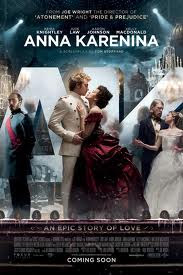 A quick surf of the Internet confirms that adaptations of Anna Karenina are as thick on the ground as photos of Kate Middleton's breasts. So why another one? Jo Wright's new film of one of the classics of all classics is yet another unfortunate example of the failure of film to capture the essence of a great novel. Though it's not a tedious or boring film, I'll give it that — the lush and theatrical scenes (it's staged as if it were a play) sweep you along exuberantly from one extravagant, highly stylised set to the next. It was only twenty minutes or so before the end that I started shuffling and fidgeting. Would that goddamn train never arrive? There'd certainly been plenty of anticipatory whistles and thrusting piston rods over the preceding half-hour.
A quick surf of the Internet confirms that adaptations of Anna Karenina are as thick on the ground as photos of Kate Middleton's breasts. So why another one? Jo Wright's new film of one of the classics of all classics is yet another unfortunate example of the failure of film to capture the essence of a great novel. Though it's not a tedious or boring film, I'll give it that — the lush and theatrical scenes (it's staged as if it were a play) sweep you along exuberantly from one extravagant, highly stylised set to the next. It was only twenty minutes or so before the end that I started shuffling and fidgeting. Would that goddamn train never arrive? There'd certainly been plenty of anticipatory whistles and thrusting piston rods over the preceding half-hour.
Now, I've nothing against Kiera Knightley as an actress, though so far in her career I think she's been good rather than great. Here she plays a much shallower, more one-dimensional Anna than the one I remember from the Tolstoy novel, an Anna who is bored with her marriage and ripe for an infatuation. The infatuation happens. She gets brilliant sex for the first time in her life. And then becomes all neurotic — a part Knightley plays well, since it's a part she played in another of her recent films, A Dangerous Method (see my review of it here). I'm afraid I tired of her distorted mouth displaying strings of saliva between her teeth. But, hey, that's film for you! At least you can imagine this when reading the book. If you wish.
Wright adopts the interesting but bizarre technique of filming the novel very stagily, using numerous 'distancing' techniques which seem intent on alienating the audience from the characters. For what reason? Obviously he wanted to come up with a radically different framework — it must have been daunting to compete with all those other interpretations of one of Russia's literary masterpieces. However, this ill-conceived Brechtian approach leaves us up the emotional creek without a paddle. Do we identify with Anna or not? Have we any sympathy at all with Karenin, her husband? And Vronsky is definitely not the sexily handsome, compelling, more well-rounded character I recall from the book — or is my memory playing tricks? In the film he's portrayed as an effete and sometimes cruel dandy.
